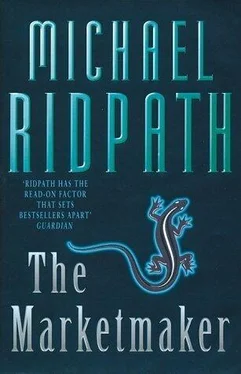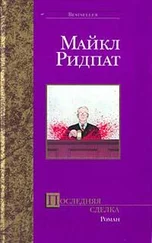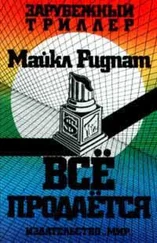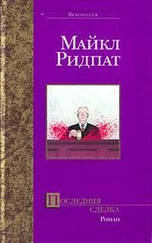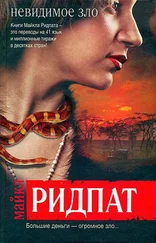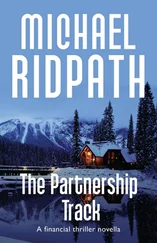Because that would have been the right thing to do. Because he was my friend and supporter. Because the School of Russian Studies wasn’t Dekker Ward.
Bastard!
So why had Dekker done it? Was I really that important to them that they wanted to shell out a million or two to keep me out of work? I supposed it was an intelligent move on some level. The School of Russian Studies did have good contacts and knowledge of Russia that Ricardo could tap. And, of course, all Russell had at the moment was promises. Dekker would have plenty of opportunity to back out before they actually put up hard cash.
I stopped at the pub just round the corner from my flat, and bought a pint and a ham sandwich. I thought practicalities. It would be very hard to get a job teaching Russian in a university now. And I probably couldn’t get another job in the City even if I wanted it. I still had six months or so to go on my Ph.D., not including the three or four months it would take just to get me back to where I’d left it. I should probably get my head down and finish that. I had three thousand pounds in my bank account, mostly the residue from the money Ricardo had lent me for clothes. I would try to live on that.
The mortgage payments on my flat were once again going to be impossible to meet. There was still no chance of selling it for more than the amount of the loan. I would have to let it and try to find somewhere cheap to live. Very cheap. Like a squat or something. I looked at the ham sandwich in front of me. I wouldn’t be able to eat out like this in future.
And what future? I looked towards it with an almost total lack of interest. If Isabel were around, or even if I knew she were alive, things would be different. But the uncertainty surrounding her disappearance weighed on me, dragging me down into a sort of pessimistic apathy. I was losing the ability to believe in her survival and, without that, the future looked unbearably grey.
I went back to the flat. It was almost tidy now. Workmen had put up a temporary door where the french windows had been. They would install something more permanent in the afternoon. Luckily the insurance covered that.
I paced through the four small rooms: kitchen, sitting room, bathroom and bedroom. It would be a shame to leave. When Joanna had first bought it, the flat had seemed extravagant, and then it had become a millstone. But there were all those bookshelves that I had spent hours, no, days putting up, shelves that ingeniously held two thousand books. There was the tiny garden: I knew every plant, every weed.
Suddenly, unexpectedly, a rush of anger swept through me. I was losing my flat because of Dekker. I had screwed up my career because of them. They had arranged to have me beaten up. Who the hell did these people think they were? Couldn’t I do something to stop them? Or at least something to hurt them? I wanted revenge, and I wanted it right then.
But what? Exposing Ricardo’s manipulation of Bocci had hurt them, but not enough. They would recover soon. I wanted to do something that would cause them permanent harm.
But what could I do? One unemployed investment banker with two months’ experience. I’d have loved to have been able to blow this money-laundering thing up in their faces. But it would require an extensive international investigation to uncover more, and it didn’t look like the DEA were about to start one, at least not into Dekker itself. I believed Dave when he talked about the indifference of the authorities.
I hated the feeling of powerlessness. There had to be something I could do.
My brooding was interrupted by the phone.
‘Nick? It’s Kate. I heard the terrible news. I was just phoning to see how you were.’
‘Which terrible news?’
I caught the hesitation on the other end of the phone. ‘Well, both things, I suppose. Isabel. And then you losing your job. It must be awful.’
‘It is. And I’ve been broken into and beaten up.’
‘Oh, God! When?’
‘The night before last.’
‘Were you badly hurt?’
‘I was knocked out. My head still hurts. And my back. And leg,’ I said, moving my stiff leg into a more comfortable position.
‘What are you doing now?’
‘Thinking about renting out the flat.’
‘Can’t you get another job?’
‘No. Dekker Ward have suddenly decided to sponsor the School of Russian Studies. My continued unemployment is the condition.’
‘Oh, no! Where are you going to live?’
‘I don’t know. I’ll find a squat somewhere. Camden’s a good area for that sort of thing, I believe.’ I could tell my voice must sound weary, low.
Kate was silent for a moment. Then she said, ‘Well, stop moping. Pack a suitcase and come round here now. You can stay with us until you find the squat of your dreams. You need people around, even if it is only me and Oliver.’
Suddenly there was nothing I wanted more than to do what Kate suggested.
‘OK,’ I said. ‘I’ll see you this evening.’
I took my bike, weighed down with saddlebags, on to the train, and arrived at the station at eight o’clock. It was on the edge of an old market town thirty miles from London, which had lost the battle to avoid becoming a dormitory community. Jamie and Kate’s house was three miles from the station, on the outskirts of the village of Bodenham.
It was still light as I rode along the narrow lanes. Chestnut trees were everywhere, bedecked with white candles. It wasn’t quiet, the birds were making a racket, and farm machinery was returning to base for the evening. I plunged down a steep hill into Bodenham and swerved left at the bottom by the duck pond, narrowly avoiding a mallard strutting importantly across the road. Even here cyclists didn’t get proper respect.
Their house was at the end of a straight half-mile stretch of lane. I didn’t hear the car until a loud horn sounded a couple of feet behind me and almost sent me out of my seat. I turned to see Jamie’s Jaguar XJS whispering along in my slipstream. He tried to overtake, but I slowed to walking pace and weaved across the road in front of him. Some people just don’t grow up.
They lived in Dockenbush Farm, an old farmhouse that was still surrounded by working buildings used by a neighbouring farmer. It had half an acre of garden, an appealing mess of unkempt roses and shrubs. On one side was a small orchard with a purple and green carpet of uncut grass and bluebells. A confused yellow rose scrambled across the front of the house, and I had to duck as I walked in at the front door to avoid a heavy branch of thorns and flowers.
‘I must tie that back,’ said Jamie. ‘Although at least it keeps out lanky gits like you.’
‘I’ll do it,’ I said. ‘In fact, I might give the whole place a good haircut.’
They had moved in two years before, just after Jamie had joined Dekker. The house had seemed to me absurdly large for the two of them plus small child, especially since I was used to seeing them in a cramped one-bedroomed flat in Chiswick. It reminded me a little of the house Jamie had grown up in, which I had seen on my first couple of visits to his family before his father had been forced to sell it. That was no coincidence, of course. I also suspected that it was no coincidence that Ricardo, too, had a nice house in the country.
Kate came through and stepped up on her bare toes to give me a kiss. ‘Hallo. Supper’s almost ready. It’s only stew, I’m afraid.’
The large old kitchen was warmed by an Aga, and pleasingly cluttered with toys and iron pots and pans. The stew was delicious. We downed a bottle of Chilean red between the three of us and talked and laughed. Then, over a spread of French cheeses, Jamie touched on the subject we had all been avoiding. ‘Ricardo talked about you this morning.’
Читать дальше
